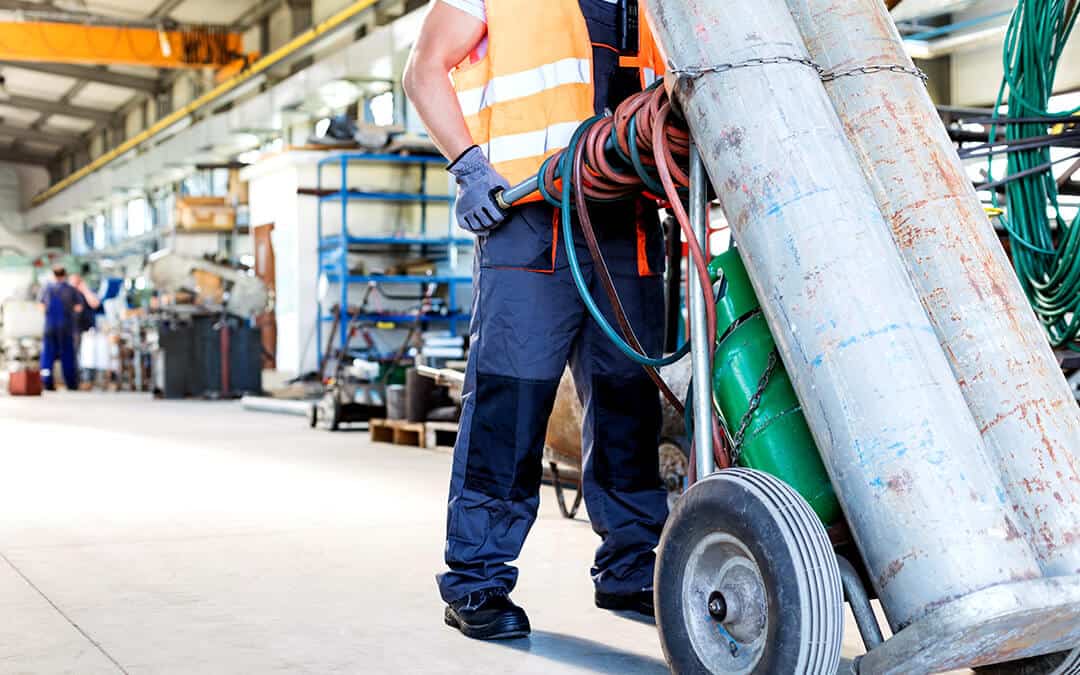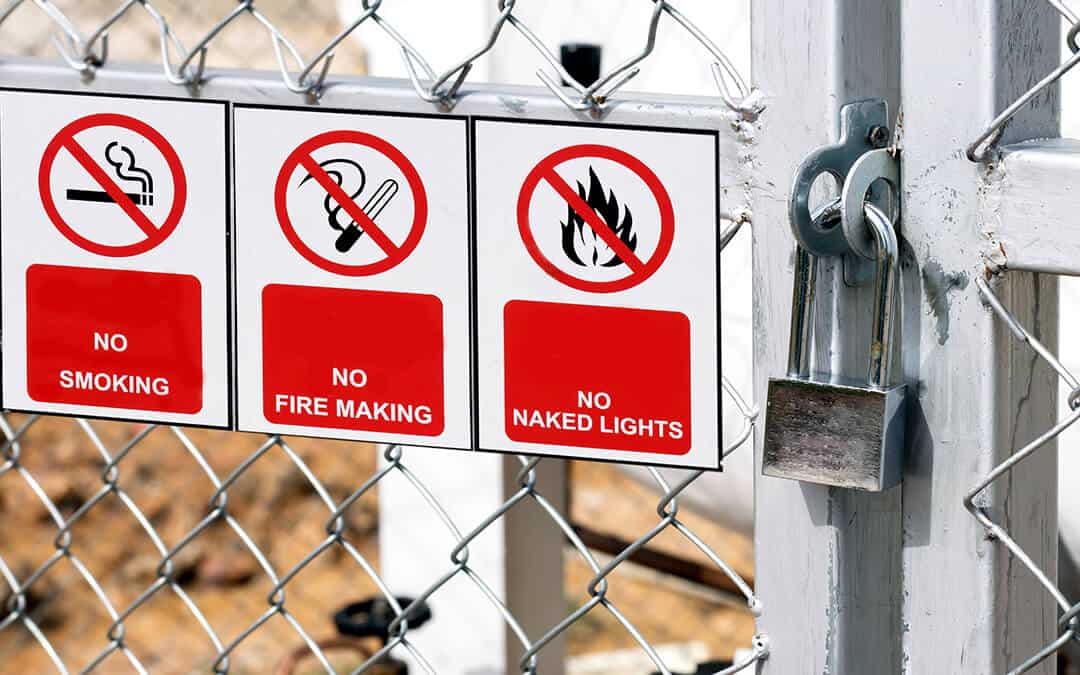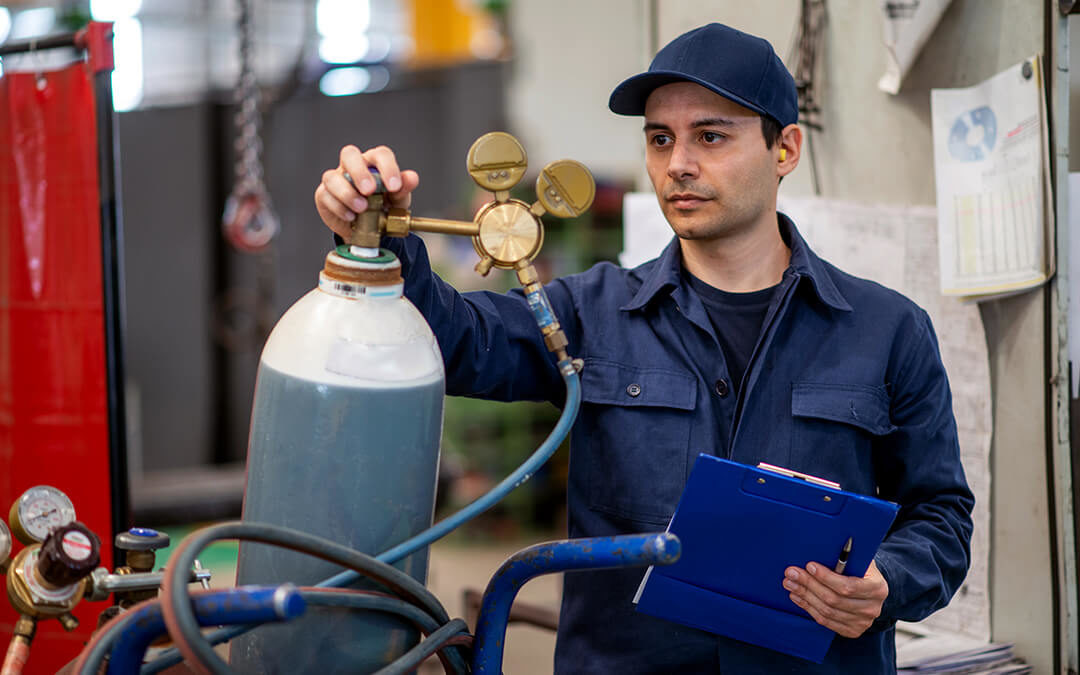Typical gas cylinders can hold compressed gas, vapor over liquid, and supercritical fluid. They are elongated, standing upright with a flattened bottom. The valve and fitting at the top are made for connecting to the receiving apparatus.
It’s important to remember that gas cylinders are not synonymous with gas tanks: Gas tanks are open-top or vented containers that store liquids under gravity.
Due to the high pressures that the gases are stored at, there are several safety regulations, rules, and guidelines that should be followed to ensure the gas is stored correctly and that users can operate gas cylinders safely.
Why Would You Use a Gas Cylinder?
Gas cylinders are often used in science and engineering buildings, machine shops, restaurants, and medical offices. Many people who require oxygen therapy may travel with an oxygen cylinder. Propane gas cylinders for grills and appliances and helium gas cylinders for filling balloons are also common gas cylinders we use in our day-to-day lives.
Things to Know About Compressed Gas Cylinder Safety

Some important things to remember when using any gas cylinders include:
- Only properly trained people should handle and/or use compressed gas cylinders
- Cylinders, even empty, should not be used as rollers or supports, or for any use other than their intended purpose
- Compressed gas cylinders should be kept away from all open flames or heat sources
- Keep compressed gas cylinders away from electrical wiring and equipment
- Gas cylinders should not be exposed to temperature extremes
- If gas cylinders have been exposed to fire, contact the supplier immediately
- All tubing should be checked regularly. If tubing is damaged, cracked, or missing, service should be discontinued immediately until tubing is replaced or repaired
- Do not attempt to repair or alter gas cylinders or adjacent equipment without the guidance of a trained professional
- Don’t attempt to transfer compressed gas from one cylinder to another
- Do not refill a compressed gas cylinder without help from a professional or without adequate training
- Notify the supplier and discontinue use if a cylinder’s container or valve is noticeably corroded, dented, cut, or damaged
- Do not refill disposable gas cylinders
- Gas cylinders should be clearly labeled from the outside and there should be no obstructions blocking access
In using toxic gases, it’s important to remember:
- Toxic gases must be stored in a ventilated gas cabinet, exhausted enclosure, or gas room
- No matter how safely they are handled, it’s recommended that the amount of toxic gases stored in laboratories be kept to a minimum
- Flow restrictors are required on most toxic gas cylinders
- Ensure that pressure-relief devices on gas cylinders vent directly to a laboratory exhaust system
- Gas detection systems may be required in laboratories using toxic gases
For more information about how gas cylinders are tested and other safety suggestions, read more at Gas Cylinder Safety and Testing.
Why Do I Need to Know About Gas Cylinder Safety?

It may go without saying that there are some safety hazards in using high-pressure equipment like compressed gas cylinders. Just as it’s important to know how to be safe, it’s important to know the hazards associated with this equipment.
Small leaks can be easily addressed by shutting the main valve to the cylinder tightly and cutting off the flow. If you suspect that the leak may have caused some damage, shut the main valve and begin diagnostics on the rest of your equipment system. In cases like these, isolating the problem and shutting the valve is the best course of action.
Of course, if you believe that there has been a larger leak or that the leak is causing a dangerous atmosphere for a person to be in, evacuate the area immediately and call 911. It is important to identify the gas and give the emergency services as much information as you can.
Is your business looking for medical-grade oxygen and other gases? At CalOx, we make it easy to get the gases you need when you need them, via subscription or delivery. We’ve been delivering medical gases to Los Angeles area businesses since 1936. With dependable deliveries and services, we’re your number one source for medical-grade gases.
